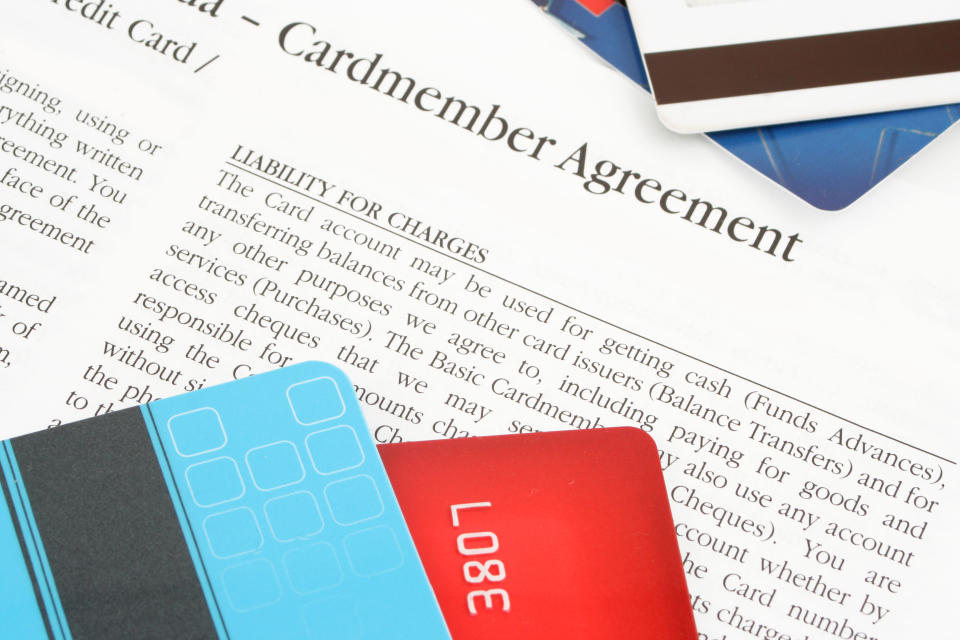5 reasons to read your credit card contract

These days, most people choose a credit card based on the perks it provides. It’s easy to be seduced by sign-up bonuses, cash back and points, but there’s a good chance we don’t know everything about the cards we’re using.
A survey by MoneyGuru, a UK-based website that compares financial products, found that 64% of credit card holders in the UK did not read the agreement before applying for a credit card. Another 60% admitted they don’t read the updates to their agreement and simply click “accept.”
Of course, this isn’t just an issue in the UK. A 2016 CreditCards.com survey found that 24% of Americans say they never read their credit card contract, followed by 22% who said they “hardly ever” read it, and 27% who say they read it “sometimes.”
It’s not all that surprising. After all, how many of us read through our cellphone contracts, car insurance “terms and conditions,” or even the iTunes agreement?
So what’s the deal? MoneyGuru concluded that people don’t read their contracts because they’re simply too complicated for most people to understand. The Flesch-Kincaid readability test is used to assess how difficult it is to read a piece of text. Using this system, MoneyGuru discovered that none of the credit card agreements in the UK were written below a 12-year-old reading level. The average reading level in the UK is 9 years old.
Things are even tougher in the US. The CreditCards.com report found that the average agreement required an 11th grade reading level, even though half of the US adult population reads at a 9th grade level or below.
While it may be a challenge, reading through your credit card contract is the best way to understand your options and responsibilities as a card user. If you find yourself overwhelmed, here are the top five things you should look for:
1. What’s your APR?
APR stands for Annual Percentage Rate, and it’s a term used to describe the amount of interest you’ll pay on your credit card balance annually. The average APR in the US is currently around 16%, but some cards assign APRs as high as 30%, depending on the applicant’s credit score and financial history. As you look over your agreement, you should see this number pretty quickly. If your APR seems higher than average, you might want to consider looking into another card.
It’s also important to note that there are different types of APRs. The most common is a purchase APR, which is applied to everything you buy with your card. You may also encounter a balance transfer APR, which will be applied when you move or transfer a balance onto a new credit card.
Some cards even offer a variable APR, which can change every billing period, and is calculated using the most recent US prime rate.
2. What are the penalties for paying late?
For the record, the best way to avoid paying any interest on your credit card is to pay off the full balance every month. If you find yourself carrying a balance, or making late payments, the fees can accumulate quickly.
If you don’t pay the minimum amount due on your credit card for 60+ days, you’ll be labeled “delinquent” and hit with a penalty APR. The typical penalty APR is 29.9% (of your outstanding balance), which is the highest interest rate banks are allowed to charge. While reading your agreement, look for the penalty APR, and how long it will be applied to your account. In some cases, if you’re more than 60 days delinquent, the penalty APR could be applied to your existing balance, and new transactions until six consecutive minimum payments are made on time.

3. Will you have to pay fees?
A lot of credit card contracts have a section labeled “fees,” and the first thing you want to look for is an annual fee. If your card has one, it will typically range from $25 to $500, based on the types of perks your card offers. They key here is to make sure the benefits you’re getting are worth the fee.
Other charges you want to be aware of include fees for balance transfers (moving money from one credit card to another), and cash advances (withdrawing cash from an ATM using a credit card.)
4. How to deal with rogue charges
You want to act immediately when someone uses your credit card to make an unauthorized purchase. But before that happens, it’s helpful to know your rights as a user. Thanks to the Fair Credit Billing Act, banks have to disclose your rights if there are inconsistencies on your billing statement. This section of your credit card agreement will tell you how to file a complaint, the materials you’ll need to make your case, and any time frame restrictions.
Knowing how to handle inconsistencies ahead of time can help you to react faster and more effectively in the future.
5. Don’t be intimidated
More and more banks are making their credit card contracts easier to understand. Citibank provides a glossary of terms for users to reference as they are reading over the agreement. They also provide numerical examples of how things like variable APR are calculated. At Chase, fees and interest rates are printed in bold, so they’re easier to pick out. The agreement is also divided up into different sections so it’s easier to read through the information.
Try your best to read through the agreement, and if you have any questions, don’t hesitate to call customer service. It’s your right to understand your contract before opening a new credit card.
Brittany is reporter at Yahoo Finance. Follow her on Twitter @bjonescooper.
Credit card sign-up bonuses have increased, but so have annual fees
Credit card debt has now reached pre-recession levels
Store credit cards could land Americans in debt
As medical costs overwhelm, more people turn to crowdfunding sites for help

 Yahoo Finance
Yahoo Finance 
